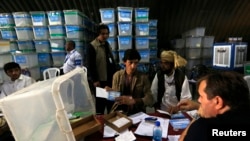Afghanistan's U.N. representative told President Hamid Karzai on Thursday that the audit of a disputed election would not be finished by Sept. 2, when Karzai had hoped to see a new leader inaugurated.
The United Nations is supervising the audit of votes from a run-off ballot between the two candidates, Abdullah Abdullah and Ashraf Ghani. Both men have claimed victory in an election meant to mark the country's first democratic transfer of power.
The U.N. envoy to Afghanistan, Jan Kubiš, told President Hamid Karzai in Kabul Thursday that the election audit - effectively, a recount of ballots cast more than two months ago - will not be completed before September 10.
Karzai is due to leave office on September 2.
In a previous statement, Karzai had said the inauguration of Afghanistan's new president must take place a month after the original inauguration date of August 2.
“President Karzai is truly in a hurry for a quick conclusion of the election process,” Karzai spokesman Aimal Faizi told Reuters. “He has already done his packing. He is exhausted, like many other Afghans.”
The audit of votes hit a snag on Wednesday when Abdullah's team pulled its observers from the process, citing dissatisfaction with the way that allegedly fraudulent votes were being handled.
Ghani's team subsequently also withdrew its observers at the U.N.'s request.
“The audit must not only have integrity, it must be seen to be even-handed by all Afghans,” U.N. deputy chief Nicholas Haysom told reporters on Wednesday.
The audit has continued under U.N. supervision, but the hiccup has sparked widespread concerns that a U.S.-brokered deal between the two candidates may be in jeopardy.
Talks on new government
Both teams said on Thursday that talks on forming a national unity government had not stopped.
“We are still discussing the unity government,” Mahmoud Saiqal, a top aide to Abdullah told Reuters, adding that the candidates were scheduled to meet again on Thursday evening.
Determining how exactly that government will look may prove tricky, however, particularly when it comes to defining the role the election runner-up will play.
A deal brokered by U.S. Secretary of State John Kerry calls for the runner-up to nominate someone to a new, specially created post called “chief executive.” That position would share control with the president over some key decisions, such as nominating the heads of the Afghan security forces.
“Our understanding of a 'unity government' is a national partnership, where political figures from both sides are represented,” said Saiqal.
But Ghani's team said it was too soon to start determining what responsibilities and powers a chief executive would have.
“The role is impossible to define at the moment,” said Daoud Sultanzoy, a senior member of Ghani's team. “There's no president [in office] to define it. Once the winner is announced, then it will be up to the winner.”
